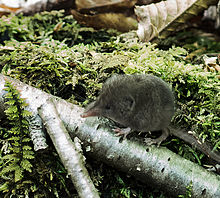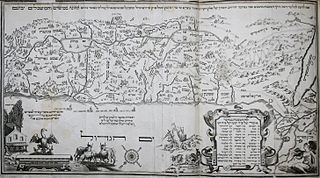
The Israelites were a group of Semitic-speaking tribes in the ancient Near East who, during the Iron Age, inhabited a part of Canaan.

Effigy Mounds National Monument preserves more than 200 prehistoric mounds built by pre-Columbian Mound Builder cultures, mostly in the first millennium CE, during the later part of the Woodland period of pre-Columbian North America. Numerous effigy mounds are shaped like animals, including bears and birds.

A Tribe Called Quest was an American hip hop group formed in Queens, New York City, in 1985, originally composed of rapper and main producer Q-Tip, rapper Phife Dawg, DJ and co-producer Ali Shaheed Muhammad, and rapper Jarobi White. The group is regarded as a pioneer of alternative hip hop and merging jazz with hip hop, influencing numerous hip hop and R&B musicians.

Shrews are small mole-like mammals classified in the order Eulipotyphla. True shrews are not to be confused with treeshrews, otter shrews, elephant shrews, West Indies shrews, or marsupial shrews, which belong to different families or orders.

A tipi or tepee is a conical lodge tent that is distinguished from other conical tents by the smoke flaps at the top of the structure, and historically made of animal hides or pelts or, in more recent generations, of canvas stretched on a framework of wooden poles. The loanword came into English usage from the Dakota language and Lakota language.
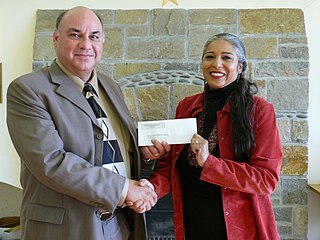
The Wampanoag, also rendered Wôpanâak, are a Native American people of the Northeastern Woodlands currently based in southeastern Massachusetts and formerly parts of eastern Rhode Island. Their historical territory includes the islands of Martha's Vineyard and Nantucket.

The Adivasi refers to heterogeneous tribal groups across the Indian subcontinent. The term is a Sanskrit word coined in the 1930s by political activists to give the tribal people an indigenous identity by claiming an indigenous origin. The term is also used for ethnic minorities, such as Chakmas of Bangladesh, Bhumiputara Tharus of Nepal, and Vedda of Sri Lanka. The Constitution of India does not use the word Adivasi, instead referring to Scheduled Tribes and Janjati. The government of India does not officially recognise tribes as indigenous people. The country ratified the International Labour Organization (ILO) Convention 107 on Indigenous and Tribal Peoples of the United Nations (1957) and refused to sign the ILO Convention 169. Most of these groups are included in the Scheduled Tribe category under constitutional provisions in India.

The red-toothed shrews of the subfamily Soricinae are one of three living subfamilies of shrews, along with Crocidurinae and Myosoricinae. In addition, the family contains the extinct subfamilies Limnoecinae, Crocidosoricinae, Allosoricinae and Heterosoricinae. These species are typically found in North America, northern South America, Europe and northern Asia. The enamel of the tips of their teeth is reddish due to iron pigment. The iron deposits serve to harden the enamel and are concentrated in those parts of the teeth most subject to wear. Members of the genera Chimarrogale, Nectogale, Neomys (Nectogalini) and some members of Sorex (Soricini) are known as water shrews, due to having a semi-aquatic lifestyle.

The Scheduled Castes and Scheduled Tribes are officially designated groups of people and among the most disadvantaged socio-economic groups in India. The terms are recognized in the Constitution of India and the groups are designated in one or other of the categories. For much of the period of British rule in the Indian subcontinent, they were known as the Depressed Classes.
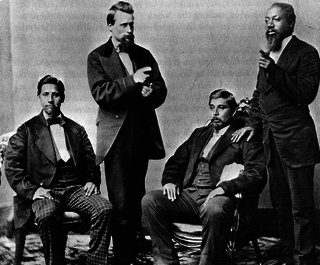
Blood quantum laws or Indian blood laws are laws in the United States that define Native American status by fractions of Native American ancestry. These laws were enacted by the federal government and state governments as a way to establish legally defined racial population groups. By contrast, many tribes do not include blood quantum as part of their own enrollment criteria.
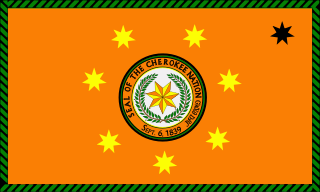
The Cherokee Nation, also known as the Cherokee Nation of Oklahoma, is the largest of three Cherokee federally recognized tribes in the United States. It includes people descended from members of the Old Cherokee Nation who relocated, due to increasing pressure, from the Southeast to Indian Territory and Cherokee who were forced to relocate on the Trail of Tears. The tribe also includes descendants of Cherokee Freedmen, Absentee Shawnee, and Natchez Nation. As of 2023, over 450,000 people were enrolled in the Cherokee Nation.
Reservation is a system of affirmative action in India created during the British rule. It provides historically disadvantaged groups representation in education, employment, government schemes, scholarships and politics. Based on provisions in the Indian Constitution, it allows the Union Government and the States and Territories of India to set reserved quotas or seats, at particular percentage in Education Admissions, Employments, Political Bodies, Promotions, etc, for "socially and educationally backward citizens."
The Yuhaaviatam of San Manuel Nation is a federally recognized tribe of Serrano people in San Bernardino County, California.
The Zardari family is a Pakistani political family which currently holds the chieftaincy of the Sindhi-Baloch Zardari tribe. It owns thousands of acres of land in the Sakrand Taluka, Shaheed Benazirabad District, Sindh, especially in the Fatohal Zardari and Balu Ja Quba villages. The family heads the Zardari tribe, which is a Sindhi-Baloch.

The William & Mary Tribe are a college football team representing the College of William & Mary in Williamsburg, Virginia. William & Mary competes in CAA Football, a single-sport NCAA Division I Football Championship Subdivision conference operated by the Tribe's primary athletic home of the Coastal Athletic Association. They are currently coached by Mike London. He succeeds Jimmye Laycock, who was the head coach of the Tribe for 39 years.

The Odisha Legislative Assembly is the unicameral state legislature of Odisha state in India. The seat of the Legislative Assembly is at Bhubaneswar, the capital of the state. The Legislative Assembly comprises 147 Members of Legislative Assembly. Out of total 147 Assembly Constituencies of Odisha Legislative Assembly, 33 seats are reserved for Scheduled Tribes (ST) and 24 seats for the Scheduled Castes (SC). It was announced by Odisha Chief Minister Naveen Patnaik that the Sachivalaya or the Secretariat building in Bhubaneswar will be called Lok Seva Bhavan.

In the United States, the use and possession of cannabis is illegal under federal law by way of the Controlled Substances Act of 1970. Cannabis is classified as a Schedule I drug under the Controlled Substances Act, determined to have a high potential for abuse and no accepted medical use, prohibiting its use for any purpose. Despite this, most states have passed laws to legalize the use of cannabis for medical purposes, while close to a majority of states have legalized for recreational use.

Survivor România is a Romanian reality game show based on the international Survivor format. The season premiered on 18 January 2020 on Kanal D.

Avatar: The Last Airbender, also known as Avatar: The Legend of Aang, is an upcoming American adventure fantasy streaming television series. It is a live-action adaptation of the animated television series of the same name (2005–2008). First announced in September 2018, Albert Kim is set to be the showrunner, with an ensemble cast including Gordon Cormier, Dallas Liu, Kiawentiio, Ian Ousley, Paul Sun-Hyung Lee and Daniel Dae Kim.

The 2023 United States elections were held, in large part, on Tuesday, November 7, 2023. The off-year election included gubernatorial and state legislative elections in a few states, as well as numerous citizen initiatives, mayoral races, and a variety of other local offices on the ballot. At least three special elections to the United States Congress were scheduled as either deaths or vacancies arose. The Democratic Party retained control of the governorship in Kentucky, flipped the Wisconsin Supreme Court and held a seat on the Pennsylvania Supreme Court, gained six seats in the New Jersey General Assembly, and won back unified control of the Virginia General Assembly, while Republicans also flipped the governorship in Louisiana and narrowly retained Mississippi's governorship. The election cycle also saw Ohio voting to enshrine abortion rights to the state constitution and legalized cannabis. The results were widely seen as a success for the Democratic Party.
